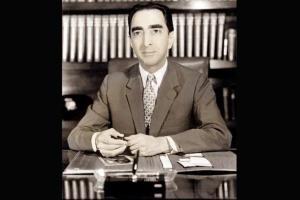Former Culture Secretary of India Jawhar Sircar will speak at the inaugural Jamshed Bhabha Memorial Lecture at the NCPA this month. And, he won't mince words on what ails the arts in India today

Dr Jamshed Bhabha, founder, NCPA
Jawhar Sircar, an IAS officer for 42 years, with long stints as India's Culture Secretary and CEO of Prasar Bharati, doesn't talk in government gobbledygook. The first speaker of the Jamshed Bhabha Memorial Lecture at the NCPA, he's going to hold forth on what ails the arts in India. And, he has a list. "I'd be trying to cover, in the space of about 50 minutes, a whole sweep of the arts," he says, from a landline in Kolkata. "For instance, antiquities. India is an ancient civilization that has literally millions of antiquities that need to circulate, but just a small section is visible in museums. There are many wonders that have gone underground, because of this stupid Act in 1972 called The Antiquities Act, which makes criminals out of all of us." The Act was intended to stop smuggling and to keep our antiquities within our borders. To which he says, "Fair enough. But, as you know, the maximum smuggling happened in the '70s and '80s, when every Hindi film had this gora smuggler, who would come to India, give an attaché full of cash and say, 'Meri murti kahaan?' All of Bombay film knew, but the stupid government didn't that this Act had actually done the reverse."
Building on this thread, he's going to touch about "how the central museums have screwed their own lives" and how we got our antiquities in the first place. "How we reconstructed and retrofitted Indian history. We have to understand the national narrative: surgery was done on Lord Ganesh, and pushpaks used to fly with Indigo-type tickets. This bizarre pride in everything that India was superior, when exactly 150 years ago, not a single Indian knew what his past was. The entire Vedic period has not left behind a spoon. Ashoka Maurya was not known to Indians still 1870. It was only in 1857 when [James] Prinsep discovered him, and for the next 20 years, there was a fight whether this fellow actually existed. Now we have appropriated him as the most glorious character after Akbar. What I'm trying to say is that this linear history, which India forgot in its amnesia, the archaeologists discovered through a spade."

Jawhar Sircar
Weaving the national narrative with a national culture, to him, is a "horrendous" thought. "Let us look at theatre. Theatre is always regional: Marathi, Parsi, Gujarati, Kannada, Bengali. They're all individual, organic creatures. You can't homogenise them into Hindi theatre. I mean, the concept itself is antithetical to the plurality of India. You can't expect Tamil theatre to come up with Hindi [dialogues]. It will be like Padosan-type Hindi. This national culture, as we put it, is sometimes visible and sometimes a concoction of our mind."
So, what are the solutions? One possible lead is the involvement of local communities; the other is the private sector. "Mumbai is lucky because it not only had an entrepreneurial class, but a philanthropic entrepreneurial class. The Tatas have gone out of their way to set up many institutions. The NCPA is an exemplary example." Here, we speak to Khushroo N Suntook, chairman at the NCPA, who says, "As you know, he (Dr Jamshed Bhabha, founder) left all his money to us. That money is comparatively peanuts compared to what a small space in Germany spends. What we need is for the billionaires—and Mumbai is supposed to have the eighth-largest population of billionaires—to come out and say they would like to support art and art education. The vital thing is for the state to provide real estate and the funds to build [institutions]. And, the corporate sector to [step forward] to house them with gurus, teachers, instruments, orchestras, recital rooms, theatrical spaces. This is what Dr Bhabha fought for." Which is why, the memorial lecture is a small step in remembering his legacy. "It's time to honour him in the manner in which he's left this magnificent NCPA to us."
When: August 21; 7 PM
Where: Jamshed Bhabha Theatre, NCPA, NCPA Marg
Log on to: ncpamumbai.com
Free
Catch up on all the latest Mumbai news, crime news, current affairs, and also a complete guide on Mumbai from food to things to do and events across the city here. Also download the new mid-day Android and iOS apps to get latest updates
 Subscribe today by clicking the link and stay updated with the latest news!" Click here!
Subscribe today by clicking the link and stay updated with the latest news!" Click here!







